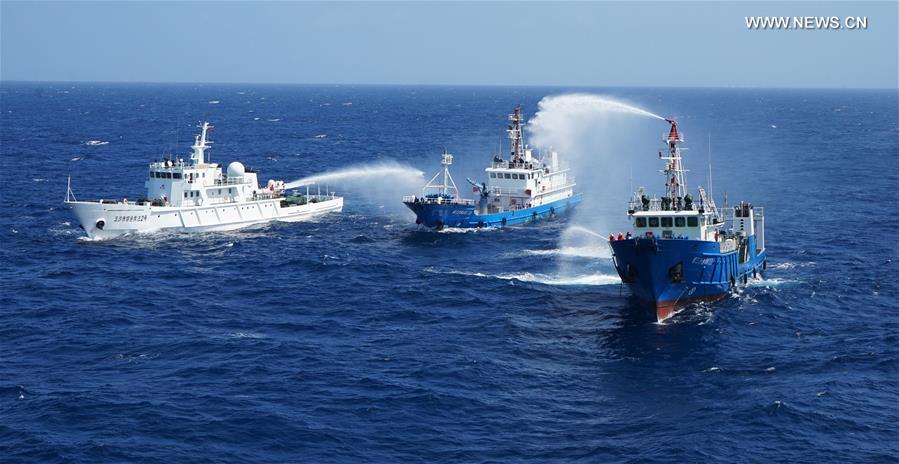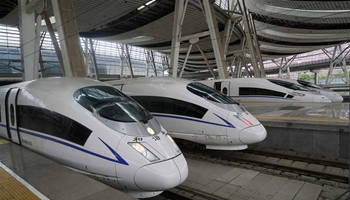
SANSHA, July 15, 2016 (Xinhua) -- Ships put out fire on a mock cargo vessel during an emergency drill at seas near Sansha in south China's Hainan Province, July 14, 2016. An emergency drill involving 13 ships and a helicopter was held Thursday morning at seas near Sansha in Hainan, the city's marine bureau said. (Xinhua/Wang Junfeng)
by Fei Liena
BEIJING, July 21 (Xinhua) -- Dialogue is key to resolving disputes in the South China Sea, and China's "dual-track" approach offers an excellent opportunity for it.
Despite all the possible jarring noises, those who participate in the ongoing foreign ministers meeting of the Association of Southeast Asian Nations (ASEAN) always need to bear that principle in mind.
The "dual-track" approach stipulates that historical disputes should be handled peacefully and properly through direct talks between the parties involved, and China and the ASEAN members should join hands to safeguard the peace and stability in the South China Sea.
Under the framework of the "dual-track" approach, parties directly involved can first discuss ways of putting aside their disputes, jointly exploring the South China Sea, and effectively managing differences. Then the parties can seek a viable solution acceptable by both through friendly negotiation.
On the other "track," China cooperates with ASEAN to comprehensively implement the Declaration on the Conduct of Parties in the South China Sea (DOC), push forward consultations on the South China Sea code of conduct, and explore new ways of cooperation between China and other littoral countries in the region.
China's "dual-track" approach not only fully complies with the spirit of peacefully resolving disputes through talks and negotiation advocated by the UN Charter, but also conforms to one of the most important provisions in the DOC.
The South China Sea arbitration in The Hague is clearly a deviation from the "dual-track" approach. The Philippines unilaterally initiated the arbitration in disregard of an agreement reached with China to settle their dispute via dialogue, and completely abandoned its solemn commitment in the DOC.
The unilateral initiation also ignored China's lawful rights enjoyed as a signatory nation of the United Nations Convention on the Law of the Sea (UNCLOS) as well as a sovereign state to choose how it wishes to settle disputes.
As to the arbitration, it can't deny China's territorial sovereignty and maritime rights in the South China Sea, as sovereignty and rights are formed through the long river of history and need no other country's approval. Furthermore, China declared in 2006 that it would exclude maritime delimitation disputes from arbitration and other compulsory settlement procedures, something permitted under UNCLOS.
China has made itself perfectly clear that it will not accept the arbitration tribunal's ruling on July 12, neither will it negotiate with the Philippines on the basis of the ruling.
The islands of the South China Sea have been Chinese territory since ancient times, and safeguarding its own territorial sovereignty and just maritime rights are the inevitable responsibilities of the Chinese government.
Chinese people aspire to peace and uphold good neighborly relations, but that doesn't mean they would roll with the punches when other countries violate their own country's territorial sovereignty and maritime rights. All along China has kept a cool head regarding the South China Sea, yet it's only fair for it to take defensive actions when need be.
The South China Sea deserves peace, not war; it deserves dialogue, not confrontation. China has the confidence that it is able to, along with ASEAN, ensure the peace and stability of the South China Sea.












